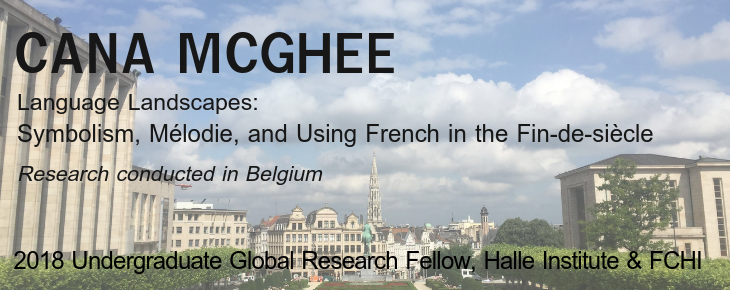
Cana McGhee, 2018 Global Research Scholar
Research Project: Language Landscapes: Symbolism, Mélodie, and Using French in the Fin-de-siècle
Research Location: Belgium
Majors: Music and French
|
As I was pursuing a directed study to investigate what would become my Honors project, my adviser encouraged me to integrate archival research into the project and find opportunities to fund such experiences. Somehow it had never occurred to me that I as an undergrad could conduct scholarly independent research abroad and have it productively contribute to my work. But after receiving funding from a music department research grant and the bulk of my support as an Undergraduate Global Research Fellow with the Halle Institute and the Fox Center for Humanistic Inquiry (FCHI). In the process of searching for undergraduate funding options, I discovered the application for the newly-established Undergraduate Global Research Fellowship, and I knew that I wanted to be among the first to seize this new opportunity on campus. The funding from the Halle Institute supported a ten-day archival research trip in Brussels. While my work with Gabriel Fauré (the primary composer of interest in the project) initially explored elements of his individual compositional aesthetic, visiting Brussels inspired me to analyze Fauré with larger, more transnational terms. Currently, Fauré’s music will be a case study in the engagement between Symbolist poetry in francophone Europe and French-language vocal music (mélodie). The cross-engagement of the literary and musical movements is furthermore situated in the context of linguistic nationalist projects in France and Belgium, as ideals surrounding language use responded to the French Revolution (1789) and Belgium’s independence (1830). Another influential figure in my project is Belgian lawyer turned art critic Octave Maus. He created and led two avant-garde groups that coordinated art and music festivals in Brussels. Fauré attended the festivals twice; yet even when Fauré was not present, his music was played on a bi-yearly basis. This lattermost fact, which I uncovered in Brussels, asserts Fauré’s value in French-speaking musical life beyond his usual Parisian circles, which is one of the more strident elements of my work. This assumption is complicated by the fact that, within France, Fauré was at times perceived as an outsider because of his non-Parisian birth and lack of conservatory training. After further reading about the relationship between French-speaking Belgians and French nationals, Fauré’s situation uncannily aligns with how the two socio-cultural groups were often in discord with one another because of Belgium’s “hybridized” social and linguistic identities. Visiting Brussels was important for this project primarily because the secondary literature about Belgian musicianship during the fin-de-siècle is limited. Considering that one of my long-term goals is to contribute to this dirge in scholarship, I was grateful for the opportunity to engage with some of the primary sources in their native context, which are held at the Contemporary Art Archives (AACB) of the Museum of Fine Arts of Belgium. The project is compelling because of the ways in which vocal music will be put forth as works which actively mirror and respond to the linguistically reformative principles guiding Symbolist writings. My research in Brussels demonstrated that musical life was remarkably in-tune with its surroundings and participated in supporting, criticizing, and collaborating with artistic communities outside of its discipline. As I begin pursuing doctoral work in Musicology, I hope to continue in this spirit of using music as a means to discuss cultural histories, rather than treating it as a cultural artefact. Without the Halle Institute’s support of my research, I doubt that I would have been able to unveil the multi-layered depth that my project has gained since returning from my summer research experience. |
